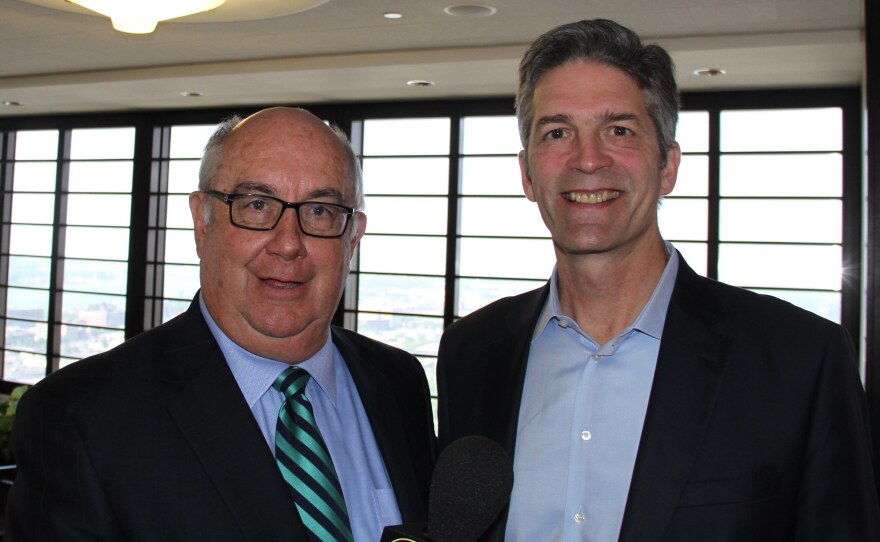Developments in energy generation, transmission, use and conservation are increasingly in the news, and the folks at DTE Energy are more than willing to share programs and initiatives in all things energy.
Greening of the Great Lakes recently ventured to DTE’s downtown Detroit headquarters to talk with leading executives about our energy portfolio, infrastructure, efficiency and conservation. DTE Energy’s operating units include an electric utility serving 2.2 million customers in Southeastern Michigan and a natural gas utility serving 1.3 million customers in Michigan.
Last month DTE Energy announced a broad sustainability initiative that will reduce the company's carbon emissions by more than 80 percent by 2050. This reduction and 2050 timeframe align with the target scientists broadly have identified as necessary to help address climate change.
“This can be done in a way that preserves affordability, reliability, and competitiveness of energy in America,” says Chairman and CEO Gerry Anderson. “We can deeply decarbonize energy in Michigan and in our country, and we can do it in a way that preserves affordability. There is no sucker’s choice between our environment and our economy.
“I really believe that we as a company and the country were on track to significantly reduce carbon emissions through the federal Clean Power Plan. But when the new administration came in and effectively rescinded the Clean Power Plan and exited the Paris agreement, it was my judgment that it was time to be more transparent, get out in front on this issue and show some leadership.
“I and my team have a conviction that it’s our responsibility to address this issue. And we’re going to do that.
“This country is in a unique position to be able to pull this off and lead while still keeping some of the lowest electricity prices in the developed world. We’re the fourth lowest in the developed world, and we can preserve that position while we go through this transition. To achieve an outcome that preserves great environmental and economic outcomes, you need to work your way through it very thoughtfully.”
Anderson says DTE “sees a steady migration away from coal. It’s time to move on to more modern ways of producing electricity. And as we do that, we see a significant mix of renewables and natural gas.
“We really need to handle this in a way that doesn’t sour the appetite for it by making it more expensive than it needs to be. Our customers and owners want us to move this way. The economics in the industry dictate that we are moving this way.
“Natural gas plays the role of 24/7 power; it’s there whenever you need it. And the renewables are obviously zero carbon and increasingly more economical as their costs continue to come down. Natural gas will play an important transition role. That role will change over time. I expect it will have a larger role early in the transition and then, as we get out into the 2050 timeframe, we’ll probably see less generation from natural gas and more from renewables. But it plays an important role helping us make the transition in a way that works for the pocketbooks of our customers.”
Anderson says the installation of three-and-a-half million smart meters is enhancing the intelligence of our country’s electric grid and helping with energy reliability through the transition.
“It’s an exciting time to be in energy because we’re in a transition in the way energy is produced—a transition that’s all positive in the long run. And we’re also in a transition in how the grid will be operated. It will be much more automated and use data analytics to make it more efficient.”
Click on the arrow above to hear Anderson's conversation with Kirk Heinze.
Jerry Norcia is DTE’s president and chief operating officer. He tells Heinze about DTE’s Nexus Pipeline project. It’s a joint venture between DTE Energy and Spectra Energy. This pipeline will deliver clean-burning natural gas safely and economically, all while minimizing environmental impact. Norcia hopes construction can begin next month.
“Traditionally Michigan has received its natural gas supplies from pipelines that are thousands of miles away. The reservoir Nexus taps is just 300 miles from Michigan and is really the vehicle that we’re investing in to connect this new and exciting supply to Michigan.
“About a third of our portfolio through 2030 will be natural gas, another third will be nuclear and renewables, and a third will be coal,” adds Norcia. “As we move toward 2050, the coal piece will start to extinguish as we retire our last coal plant in the 2040 timeframe.” Then the company’s energy mix will be about 50/50 between natural gas and nuclear/renewables.
Norcia says nuclear is an efficient and clean way to produce power.
“The challenge with nuclear right now is the economics. With the abundant supply of natural gas we’re blessed with in North America – and with American ingenuity which has really driven tremendous supply advancements in the natural gas industry – the economics are very difficult to make nuclear work.”
The cost of storing renewable energy in batteries has been gradually falling, explains Norcia. “But before batteries become dominant in our operations, the costs are going to have to come down much more significantly. Batteries will become a part of our future, but the technology has to evolve significantly.”
Irene Dimitry, DTE Energy’s vice president for business planning and development, advises that as exciting as new energy production technologies are, let’s not lose sight of the prodigious importance of energy conservation.
“We have many programs that we offer our customers to help them conserve energy,” Dimitry says. “Since these programs started in 2009, more than two million customers have participated in the programs. Our customers will save up to $600 million in energy costs through the life of the things they did last year.”
Such ‘things” could be recycling a refrigerator, changing to LED lightbulbs, or putting in new windows. “These actions save money and energy.”
Other ways to save money this summer are to dial up your thermostat a few degrees and close your blinds or shades to block the sun and use your ceiling fan to help keep the home cool.
Dimitry is excited about the new DTE Insight app that allows customers to monitor and control their home’s energy use. And it can help lower bills.
“It helps customers understand how they’re using their energy.”
Free energy consultations are available to help customers learn how they can save energy at home. The company’s website offers an array of information for customers on how to save energy.
“Our customers are looking to save energy and money, and they look to us as the experts to help them figure this out. So we’re right there to help them.”
Greening of the Great Lakes airs inside MSU Today Sundays at 4:00 on 94.5 FM and AM 870.





